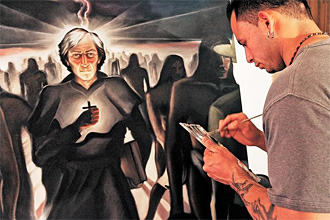 |
 |
 |
 Vallarta Living | Art Talk | May 2007 Vallarta Living | Art Talk | May 2007  
Father Kino's Memory Politicized
 Lourdes Medrano - Arizona Daily Star Lourdes Medrano - Arizona Daily Star


| | Artist Miguel Angel Grijalva works on his painting titled "Restitution of the Essential," which ties Father Kino to today's border issues. (Greg Bryan/Arizona Daily Star) |
In a Tucson artist's painting of Father Eusebio Francisco Kino, the Jesuit missionary forcefully emerges from the past to confront modern-day maladies of an international border that didn't exist in his day.

Kino, who died nearly three centuries ago, is depicted next to indigenous people as he encounters a Mexican illegal border-crosser, a Border Patrol agent and a member of the Minuteman Civil Defense Corps.

In Miguel Grijalva's oil painting, guns are dropped at the sight of Kino, one of Southern Arizona's most recognized historical figures. In real life, the artist knows that when it comes to the U.S.-Mexican border, things are more complicated.

"The missions Father Kino founded are still going strong on both sides of the border," Grijalva said. "But the border is just falling apart, it's falling out of control."

Amid the annual May celebration that honors the priest in his final resting place of Magdalena de Kino, Sonora, the memory of the priest is being increasingly politicized.

In last year's festival, Kino was portrayed as an illegal entrant in handcuffs. This week, Grijalva will unveil his painting during the Magdalena event. Meanwhile, in Tucson, a Carmelite priest and a group of retired educators and other professionals are working with Sonora residents to establish an educational center somewhere near the border, in part to promote Kino's legacy in the same vein.

"We are all hungry for a figure that says, 'There are no borders, we are one people,' " Father Vicente Lopez said in his Midtown home.

Although the tolerance of illegal immigration among people of faith is nothing new, the elevation of Kino as standard bearer has only recently flourished. And it is taking place as the Vatican considers the Italian-born missionary for sainthood.

Lopez said some may criticize Kino, who started or founded more than 20 missions in what is now Southern Arizona and Northern Sonora, for spreading Christianity to Indians of the Pimeria Alta. But he said the missionary did so while respecting their language and identity.

Following Kino's example of respect for indigenous people and for convivencia — living together — can go a long way toward addressing border-related problems that are magnified by anti-immigrant attitudes on the part of lawmakers and newcomers who don't know the area's history, Lopez said.

"That's not the real story of the border," the Tucson priest said. "The real story is that we've lived together and that we've depended upon one another, and that we have shared family values, shared family blood lines. We are not all illegal, or undocumented. Some of us have been here for centuries."

Just like Kino advocated in the late 1600s and early 1700s, Lopez said, people on both sides of the border and all sides of the illegal-immigration debate must look for ways to coexist peacefully.

But Minuteman President Chris Simcox said the chaos surrounding the border cannot be solved merely by disarming his group and entering into a dialogue.

"If I came face-to-face with Jesus I wouldn't drop my gun," he said, adding that the Minuteman volunteers who patrol the border for illegal activity choose to arm themselves for protection.

Regardless of what supporters of illegal immigration do, Simcox said his group would continue its work in Arizona. "Our mission is to bring order to the border . . . faith or any deity is not going to solve this issue."

Meanwhile, the founder of Mothers Against Illegal Aliens said that as a Christian, she is offended by the use of Kino's name to encourage people to sneak into the country illegally.

"Those people, what they're doing is using a religious icon to benefit their cause, and it's shameful," Michelle Dallacroce said.

The Rev. Robin Hoover, leader of Humane Borders, which operates water stations in the desert for illegal entrants, said he isn't intimately familiar with Kino's work. But he said Kino's legacy could be effective in drawing attention to border and immigration matters.

"It's a perfect scenario — give the people something to identify with," Hoover said.

Contact reporter Lourdes Medrano at lmedrano@azstarnet.com. | 
 | |
 |



